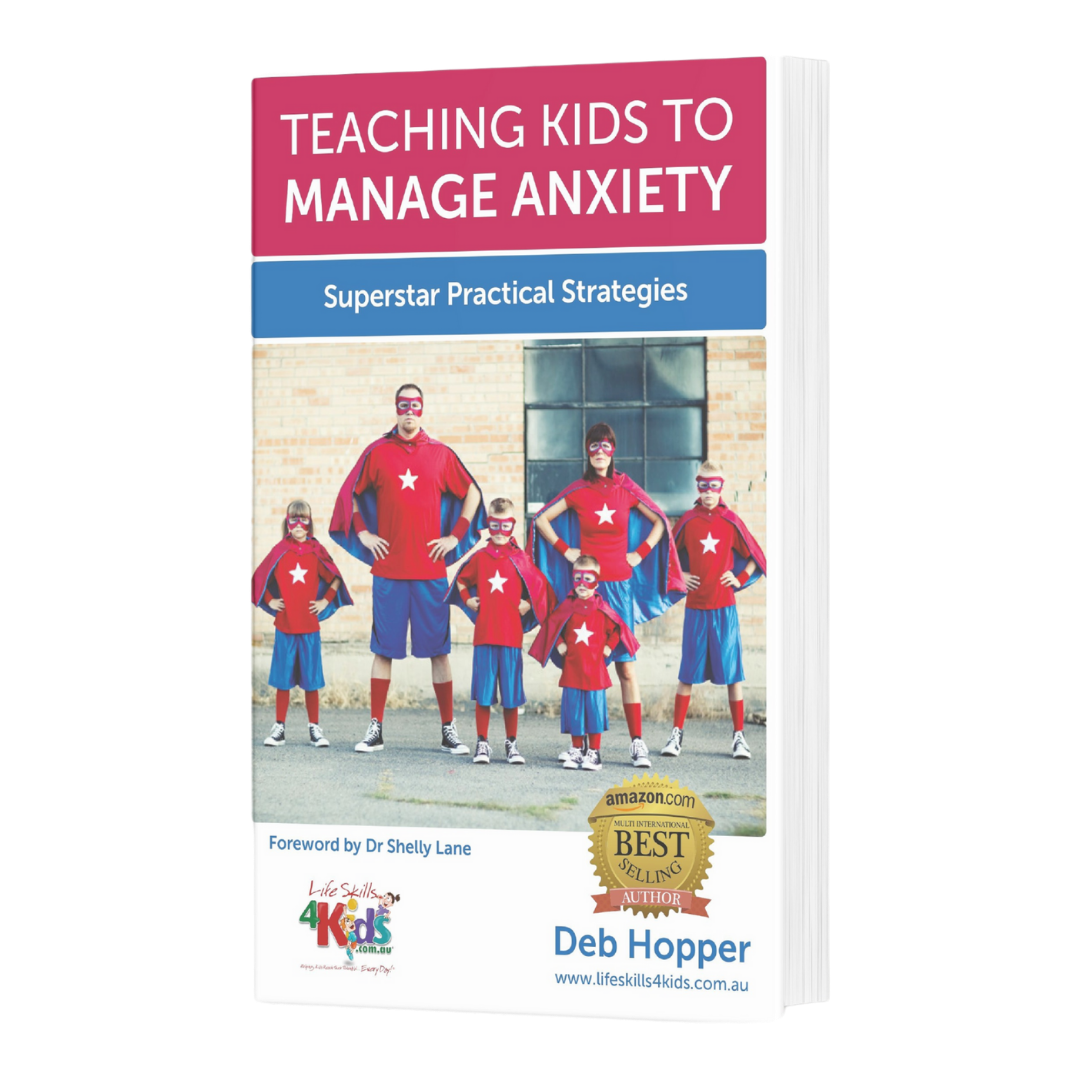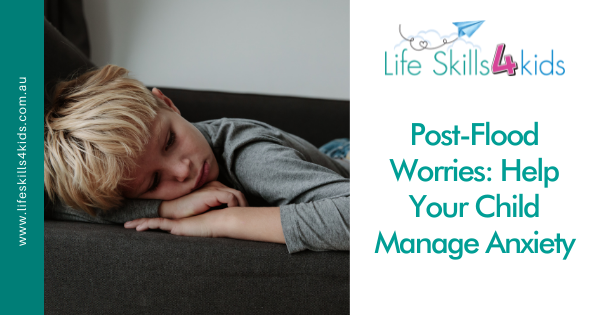After a flood, many families will take time to recover. This will depend partly on the level of trauma a family suffered during the actual event, and how quickly life can return to normal after the event.
For people who had to evacuate their homes, those whose homes were destroyed, or those who lost significant possessions or family pets, the process will be longer. This also depends on the amount of recovery support available, whether the family suffers ongoing financial hardship, and how long and arduous the process of returning to normal life is.
Children look to parents and carers in times of crisis to know how they should behave and feel. It’s important to stay calm and model a healthy stress response (easier said than done!) to help your child feel secure and comforted. Self-care is vital during this time because you are unable to give to those around you if your own cup is empty. If you need help during this time, don’t be afraid to reach out and ask.
Children and young people function better when they have an understanding of what has happened, so encourage your child to ask questions or talk about the flood. Provide openings to get the conversation started, such as sharing your own feelings.
Children and young people don’t always talk about what’s going on inside, so check the list below to help you figure out if your child is anxious after the floods.
How do I tell if my child is worried?
A child’s reaction after a disaster depends on their age, developmental level, and previous exposure to disasters. Different coping styles also mean that kids react in different ways; some might withdraw, while others will experience angry outbursts, agitation or irritability. The following reactions are common after a natural disaster:
- Fear of being separated from family members
- Worry that something bad will happen to a caregiver or loved one
- Tantrums, outbursts, or meltdowns
- Strange physical ailments such as stomach aches or aches and pains
- Increased activity levels
- Loss of concentration or inability to pay attention
- Withdrawal from normal social interactions
- Worry over their safety or the safety of a family member or pet
- Falling school grades
- A persistent focus on the flood in play or conversation
- Loss of interest in previously enjoyable activities
- Appetite changes
- Regression to earlier behaviours such as baby talk or bedwetting
- Increase in risky teen behaviours, such as drinking or substance abuse, self-harm, or undertaking dangerous activities
What can I do to help my child?
Parental involvement in a child’s world is crucial to post-disaster recovery. Staying involved tells your child that they can trust you and depend on you to be there for them. Although it can be difficult to find time, it will pay off as your child learns to manage their emotions and anxiety in the recovery phase of a disaster.
Leaving yourself open to conversations is important as children try to process their experiences. You might find yourself answering the same question more than once; try to be patient. Clarify the question so you understand what’s behind it. Children need to know what’s happening in the family, with their school, and in the community. Keep it age-appropriate and don’t overwhelm them with too much information, but enough that they know what’s happening and can feel secure. Ask for opinions or ideas where appropriate to help your child feel involved.
Check out the following list of ideas for ways to help your child manage their anxiety during the recovery phase.
Tips for managing anxiety after the floods:
- Mealtimes and bedtime are good opportunities to talk. Prepare to turn off the TV or take a little extra time saying good night to give your child the chance to tell you what’s on their mind
- Young children will benefit from extra stories and physical touch to reassure them
- Try to model calm responses to stressful situations. Your child is watching you to know how they should behave under the same circumstances
- Remember that your ability to cope influences your child’s recovery, so it’s important to care for yourself as well
- Shield your child from excess exposure to the news or adult conversations that may trigger trauma memories or unnecessarily frighten a child
- Monitor media use, especially for older children who may have their own social media accounts. Set limits and be prepared to stand your ground for the sake of your child’s mental health
- Reassure your child that they are safe now, even if you have to do it repeatedly
- Spend extra time together, reading, playing games, or spending time in nature. Time spells love to a child, and love means feeling secure. Remember to tell them you love them often.
- If your family has lost a pet, pay attention to the grief process and mourn appropriately. Hold a memorial service or do something else to remember the life of your pet. Speak of the memories you have of your furry friend and let your child know that it’s OK to grieve and feel sad.
- Do your best to establish a routine to help your child feel secure. An example is brushing your teeth before bed. It might seem like a small thing, but it’s a familiar activity that helps a child feel safe.
- Reassure your child that friends or loved ones are being cared for even if there is no communication. Talk about the volunteers who are helping people.
- Do your best to stay healthy with adequate water, activity, and a good diet along with plenty of rest.
- Maintain regular mealtimes and bedtimes; knowing what to expect provides important structure that helps children to feel safe.
- Encourage children to help and continue to allocate small chores as part of daily life. Children feel better when they are doing something positive to help others.
- Think of ways to alleviate boredom if the disruption has put a stop to normal extracurricular activities such as sports or youth activities. Try board games, arts and crafts, or meeting up with other flood-affected friends instead.
- Avoid negative reactions to annoying or irritating behaviours such as clinginess, repeated questions about the floods, acting out flood play, or seeking reassurance. Just understand that your child is doing their best to cope and be patient.
- Maintain a positive mindset and speak of the future in hopeful terms. Encourage your child to see the good in the situations that you find yourselves in.
- Communicate with teachers about what to expect from your child and be prepared to spend extra time helping with homework if your child is experiencing a lack of concentration
- Get involved in community activities. While helping in the community is good for positive feelings, try to find some community activities unrelated to floods for a mental break. Storytime at the library, activities at the YMCA, or church or community youth groups are all good ways of connecting with others who might have been through similar experiences.
What if my child needs more help?
There is no one-size-fits-all solution to trauma, and some kids will need extra help to process their experiences. If your child is still struggling more than six weeks after the event, it might be time for extra help. Don’t be afraid to reach out or assume that others are more important than you are. Your story and experiences are as relevant as anyone else’s, and getting professional help may be the next step you need to take in your recovery.
If you would like to know more about how to help your child manage anxiety, head over to my website, https://www.lifeskills4kids.com.au/ for lots of helpful resources and handy tips.
Teaching Kids to Manage Anxiety
Kids today are growing up in a fast-paced world where information and opportunity overload can be overwhelming.
Based on many years of clinical experience as an Occupational Therapist, Deb Hopper has been using her Just Right Kids® Model to teach children to communicate and manage their stress and anxiety by:
- Identifying their “body speed”,
- Understanding their stress triggers, and
- Implementing simple strategies to reduce anxiety and stress.
“This is quite simply the best, most comprehensive and practical bookI have ever read to help teach children – and many grownups – how to manage anxiety. It is written in an easy to read way with lots of fabulous graphics. This brilliant book needs to be in every home, every school and every library.” — Parenting author and educator Maggie Dent
Explore
- How the body reacts to anxiety and impacts on our ability to think and get an action plan together
- How to teach your children to identify when their body and mind is anxious, and how to tell you
- Sensory overload and how this can push children into being anxious
- Strategies to reduce screen time that you can start today (because this will help reduce anxiety in your house and make life more peaceful


